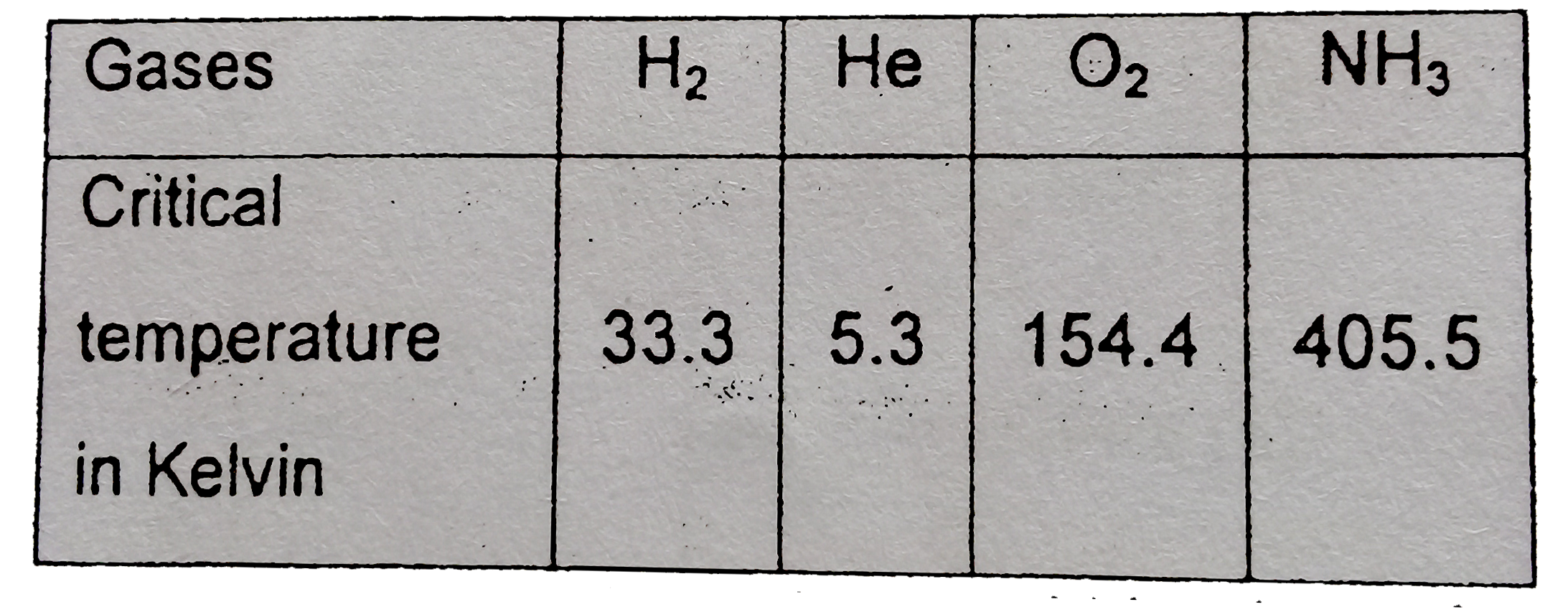Gases posses characteristic critical temperature which depends upon the magnitude of intermolecular forces between the particles. Following are the critical temperatures of some gases.
GasesH2HeO2N2Critical temperature in kelvin33.25.3154.3126
From the above data what would be the order of liquefaction of these gases ? Start writing the order from the gas liquefying first
H2,He,O2,N2
He,O2,H2,N2
N2,O2,He,H2
O2,N2,H2,He
The correct Answer is:D
Higher the critical temperature, more easily is the gas liquified. Hence, order of liquefaction starting with the gas liuefying first will be O2,N2,H2,He.
Note Critical temperature of a gas may be defined as that temperature above which it cannot be liquified howsoever high pressure may be applied on the gas.
Topper's Solved these Questions
- BOOK - NCERT EXEMPLARCHAPTER - STATES OF MATTEREXERCISE - MCQ More Than One Option4videos
STATES OF MATTER
- BOOK - NCERT EXEMPLARCHAPTER - STATES OF MATTEREXERCISE - Short Answer Type Question23videos
STATES OF MATTER
- BOOK - NCERT EXEMPLARCHAPTER - SOME BASIC CONCEPTS OF CHEMISTRYEXERCISE - All Questions45videos
SOME BASIC CONCEPTS OF CHEMISTRY
- BOOK - NCERT EXEMPLARCHAPTER - STRUCTURE OF ATOMEXERCISE - All Questions53videos
STRUCTURE OF ATOM
Similar Questions
Gases possess characteristic critical temperature which depends upon the magnitude of intermolecular forces between the gas particles. Critical temperatures of ammonia and carbon dioxide are 405.5 K and 304.10 K respectively. Which of these gases will liquify first when you start cooling from 500 K to their critical temperature ?
View SolutionGases possess characteristic critical temperature which depends upon the magnitude of intermolecualr forces between the gas particles, critical temperatures of ammonia and carbon dioxide are 405.5 K and 304.10 K respectively. Which of these gases will liquefy first when you start cooling from 500 K to their critical temperature ?
View Solution
Knowledge Check
- Question 1 - Select One
GasH2HeO2N2Critical temp. ink33.25.3154.3126
From the above data, what would be the order of liquefication of these gases? Start writing the order for the gas which liquefies first:AH2,H,O2,N2BH2,O2,H2,N2CN2,O2,He,H2DO2,N2,H2,He - Question 2 - Select One
Gases posses characteristic critical temperature which depends upon the magnitude of intermolecular forces between the particles. Following are the critical temperatures of some gases.
GasesH2HeO2N2Critical temperature in kelvin33.25.3154.3126
From the above data what would be the order of liquefaction of these gases ? Start writing the order from the gas liquefying firstAH2.He,O2,N2BHe,O2,H2,N2CN2,O2,He,H2DO2,N2,H2,He - Question 3 - Select One

Gases possess characteristic critical temperature which depends upon the magnitude of intermolecular forces between the particles. Following are the critical tempeatures of some gases. From the above data what would be the order of liquefaction of these gases? Start writing the order from the gas liquefying first.AHe,H2,O2,NH3BNH3,O2,H2,HeCNH3,He,O2,H2Dnone of these
Gases possess characteristic critical temperature which depends upon the magnitude of intermolecular forces between the gas particles. Critical temperatures of ammonia and carbon dioxide are 405.5 K and 304.10 K respectively. Which of these gases will liquify first when you start cooling from 500 K to their critical temperature ?
View SolutionGivenGasH2CH4CO2SO2critical 33190304630
temperature /K
ON the basic of data given above , predict which of the following gases shows least a dsorption on a definite amount of charcoal ?View SolutionOn the basis fo data given below predict which of the following gases shows least adsorption on a definite amount of charcoal?
GasCO2SO2CH4H2Critical temp./K30463019033View SolutionGivenGasH2CH4CO2SO2critical 33190304630
temperature /K
ON the basic of data given above , predict which of the following gases shows least a dsorption on a definite amount of charcoal ?View SolutionOn the basis of data given below predict which of the following gases shows least adsorption on a definite amount of charcoal?
GasCO2SO2CH4H2Critical temp./K30463019033View Solution

